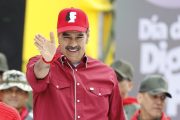
We observed on January 14 that Venezuela’s opposition-controlled National Assembly, led by the legislature’s president, Juan Guaidó (shown), is calling for the removal of Marxist Nicolás Maduro from the presidency. Maduro was sworn in for a second six-year term on January 10, even though his presidency has been declared null and void by 13 of Venezuela’s neighbors.
Two days after Maduro’s inauguration, U.S. Secretary of State Mike Pompeo declared that “The Maduro regime is illegitimate and the United States will work diligently to restore a real democracy to that country,” adding that “We are very hopeful we can be a force for good to allow the region to come together to deliver that.”
As the opposition to Maduro attempts to solidify and gain traction, Reuters reported on January 22 that Vice President Mike Pence had taped a video message for the people of Venezuela in English with a few Spanish words and phrases mixed in.
“Hola [Hello]. On behalf of President Donald Trump and all the American people, let me express the unwavering support of the United States as you, the people of Venezuela, raise your voices in a call for freedom,” Pence said.
A January 22 report in The Hill described the Trump administration’s verbal support for Guaidó as “a critical test of its hemispheric policy.” It observed that Guaidó is the apparent leader and a likely candidate to replace Maduro, but currently lacks the power necessary to assume the presidency. The Hill said, “the United States will now need to decide how it deals with him.”
Guaidó, speaking to a crowd of opposition supporters in Caracas on January 11, said that the nation’s constitution gives the legislature the right to assume transitional power after declaring Maduro a “usurper.”
Brazil’s government issued a statement on January 12 saying it recognized Guaidó as the country’s rightful president and welcomed his readiness to “constitutionally assume the Venezuelan presidency.”
The Hill noted that Guaidó has received support from entities such as the Organization of American States (OAS), Brazil, Chile, and the U.S. territory of Puerto Rico.
“We join the claim of the vast majority of the governments of the American hemisphere, acknowledging Juan Guaidó as the acting president of the Republic of Venezuela” the report quoted Puerto Rico’s Governor, Ricardo Rossello (D), in a January 18 statement, signed along with former Caracas Mayor Antonio Ledezma.
Photo: AP Images
Related articles:
Venezuela Legislature Wants Maduro Out; Brazil Recognizes Guaidó as President
Pressure Building to Remove Venezuela’s Marxist Dictator
Venezuela’s Marxist President Maduro Inaugurated for Second Term




